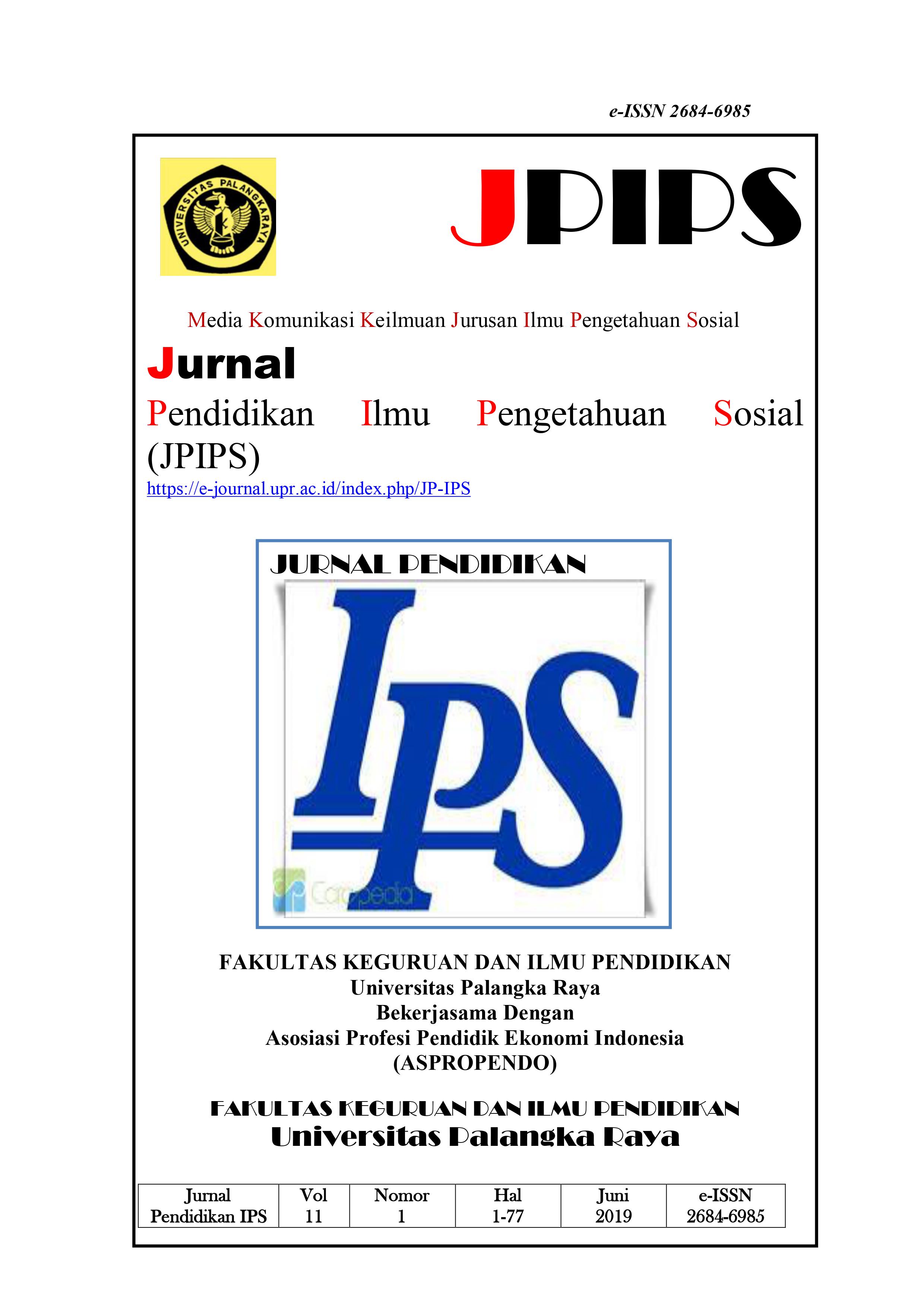Menavigasi Relevansi Pendidikan IPS Di Era Disrupsi
Keywords:
relevance, Social Sciences education, era of disruptionAbstract
This article discusses the importance of Social Sciences (IPS) education in facing the challenges that continue to grow in the era of globalization and disruption. Social studies education has an important role in preparing students to become knowledgeable citizens and able to think critically. However, in this era of disruption, social studies education is faced with various challenges, including adapting the curriculum to the needs of an increasingly complex and dynamic era. This article uses a qualitative approach in its research through literature study techniques, researchers analyze the relevance of social studies education in the era of disruption. The results of this research provide an indepth understanding of how social studies education can be adapted and strengthened amidst ongoing global issues. By adapting the curriculum and appropriate teaching methods, social studies education can prepare the younger generation to face and be part of the solution in overcoming existing challenges wisely. This article also identifies factors that influence the success of adapting social studies education to face existing challenges. Thus, this article makes an important contribution in navigating issues of the relevance of Social Sciences Education in an era of disruption, as well as providing comprehensive insight and understanding of this topic.
Downloads
References
Adams Becker, S., Cummins, M., Davis, A., Freeman, A., Hall Giesinger, C., Ananthanarayanan, V., Langley, K., & Wolfson, N. (2017). NMC Horizon Report: 2017 Library Edition. The New Media Consortium.
Amin, M. (2021). Peran pembelajaran IPS dalam pembentukan karakter siswa, Jurnal Pendidikan IPS, 7(2), 105-115, from https://doi.org/10.31219/osf.io/8x79f
Aziz, M. (2023). Membangun lingkungan yang mendukung kreativitas dalam pendidikan. Jurnal Inovasi Pendidikan, 12(1), 23-34, from https://www.journal.uny.ac.id/index.php/jinov/article/view/45678
Darrell, R. S., Crippen, K. J., & Archambault, L. M. (2018). Integrating Digital Technologies in the Social Studies Classroom: A Framework for Understanding Teacher Pedagogical Beliefs. Contemporary Issues in Technology and Teacher Education, 18(1), from https://citejournal.org/volume-18/issue-1-18/social-studies/integrating-digital-technologies-in-the-social-studies-classroom-a-framework-for-understanding-teacher-pedagogical-beliefs
Ekawarna, E. (2023). Mengembangkan Sikap Proaktif Siswa dalam Menghadapi Perubahan di Era Disrupsi. Jurnal Inovasi Pendidikan, 12(2), 45-56, from https://www.journal.uny.ac.id/index.php/jinov/article/view/56789
Fitriana, S. (2019). Transformasi pendidikan tinggi di era disrupsi (dampak dan konsekuensi inovasi). In Prosiding Seminar Nasional Pascasarjana (Vol. 2, No. 1, pp. 812-818), from https://proceeding.unnes.ac.id/snpasca/article/view/375
Fikri, A. (2019). Pengaruh globalisasi dan era disrupsi terhadap pendidikan dan nilai-nilai keislaman. Sukma: Jurnal Pendidikan, 3(1), 117-136, from https://doi.org/10.32533/03106.2019
Harris, J. L., Al-Bataineh, M. T., & Al-Bataineh, A. (2019). Examining Teacher Technology Integration from the Lens of the SAMR Model. Journal of Research on Technology in Education, 51(3), from https://www.tandfonline.com/doi/full/10.1080/15391523.2019.1592940
Johnson, L. L., Schaefer, M. B., & Dara, J. (2020). Fostering Intercultural Understanding through Digital Storytelling. TechTrends, 64, from https://link.springer.com/article/10.1007/s11528-019-00442-7
Kasmawati. (2019). Penerapan pendekatan pembelajaran aktif untuk meningkatkan pemahaman konsep dan motivasi belajar siswa. Jurnal Ilmiah Pendidikan IPS, 6(2), 45-58.
Keengwe, J., Adjei-Boateng, E., & Diteeyont, W. (2017). Digital Citizenship within Global Contexts. Computers in the Schools, 34(1-2), from https://www.tandfonline.com/doi/abs/10.1080/07380569.2017.1305602
Mahendra, P. R. A. (2023). Peran Pendidikan IPS dalam Pendidikan Multikultural. Journal on Education, 5(2), 4468-4475, from https://www.jonedu.org/index.php/joe/article/view/1171
Nugroho, A. Y., Hartono, H., & Sudiyanto, S. (2020). Analysis Kebutuhan Pembelajaran Ilmu Pengetahuan Sosial Di Sekolah Dasar. Jurnal Kependidikan: Penelitian Inovasi Pembelajaran, 4(1), 15-25, from https://journal.uny.ac.id/index.php/jk/article/download/19736/pdf
Nursyifa, A. (2019). Transformasi pendidikan ilmu pengetahuan sosial dalam menghadapi era revolusi industri 4.0. Journal of Civics and Education Studies, 6(1), 51-64, from https://www.jonedu.org/index.php/joe/article/view/1171
Prastin, M. A., Damayanti, S., & Permana, E. P. (2022). Pengembangan Media Buku Saku IPS Materi Keragaman Sosial Budaya Kelas IV SDN Sukorame 2. Prosiding SEMDIKJAR (Seminar Nasional Pendidikan dan Pembelajaran), 5(pp), 727-734, from https://proceeding.unpkediri.ac.id/index.php/semdikjar/article/view/2407
Resta, P., & Laferrière, T. (2018). Global Collaboration in the Digital Age. Educational Technology Review, 26(1), from https://www.learntechlib.org/primary/p/182005/
Rifai, A. (2020). Pentingnya inovasi dan kreativitas dalam pendidikan di era disruptif. Jurnal Pendidikan Inovasi, 8(2), 45-57, from https://www.journal.uny.ac.id/index.php/jpi/article/view/29384
Sutrisno, B. (2021). Mengembangkan kreativitas siswa sebagai bekal menghadapi tantangan era disrupsi. Jurnal Inovasi Pendidikan, 11(1), 23-34, from https://www.journal.uny.ac.id/index.php/jinov/article/view/33462
World Economic Forum. (2020). The Future of Jobs Report 2020. World Economic Forum. https://www.weforum.org/reports/the-future-of-jobs-report-2020














